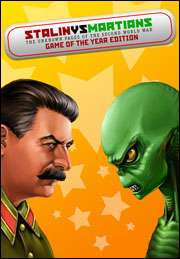Stalin vs. Martians
| Stalin vs. Martians | |
|---|---|
 | |
| Developer(s) |
Black Wing Foundation Dreamlore N-Game |
| Publisher(s) | Mezmer Games |
| Platform(s) | Microsoft Windows |
| Release date(s) | April 29, 2009[1] |
| Genre(s) | Real-time strategy |
| Mode(s) | Single-player |
Stalin vs. Martians is a parody real-time strategy video game developed by Black Wing Foundation, Dreamlore and N-Game, released on April 29, 2009. Described as "trashy and over-the-top"[2] by its creators,[3] the game mocks World War II strategy games and utilizes pythonesque humor. The developers state that Stalin vs. Martians is "obviously a parody, which sometimes gets close to being a satire" and is "halfway to becoming a trash icon of gaming industry for years".[4] In some interviews the lead designer of the game compares Stalin vs. Martians to the Troma films.[5]
As of July 22, 2009, the game is no longer available to be purchased. The reason for this is currently unknown.[6][7][8][9] The official website contains information that upgraded version of Stalin vs. Martians is on the way and will be available for download.[10]
Reception
Stalin vs. Martians received scathing reviews from critics. It has an average score of 23.41% on GameRankings as well as 25% on Metacritic. GameSpot awarded the game 1.5/10, calling it "perhaps the worst RTS game ever created". The site also named it 2009's Flat-Out Worst Game.[11] IGN, which rated the game a 2/10, noted the game's total lack of any RTS-related elements and asked whether it was 'made in 1994 and sealed into a vault until 2009' given how dated the visuals looked.[12] Resolution, awarding the game 35%, warned readers not to purchase the game, but conceded that it is occasionally "incredibly amusing".[13] Rock, Paper, Shotgun called the game "rubbish" but admitted: "there’s certainly car-crash value, especially if you tie yourself in theoretical knots deciding exactly how much of the game is satire".[14] The Escapist was more positive, noting that "Whatever it was, it's clear that the development team had a very fun time making the game, and filling it with as many Soviet clichés as possible." and "The presentation can be funny, and it's so absurd at times that you really have to experience it for the sheer audacity of it, but ... the game itself is below average at best".[15] Russian MTV programme Virtuality and its spin-off portal Games TV were quite enthusiastic about the game and its humour.[16]
See also
Notes
- ↑ Faylor, Chris (April 24, 2009). "Stalin vs Martians Now Coming April 29". Shacknews. Retrieved 2009-04-24.
- ↑ "IGN: Stalin vs. Martians Announced".
- ↑ "Paradox Interactive press release". Retrieved 2009-03-20.
- ↑ http://www.gamasutra.com/php-bin/news_index.php?story=23601Martians/
- ↑ http://www.2404.org/interviews/4802/Stalin-vs.-Martians-Interview/
- ↑ http://store.steampowered.com/app/25870/
- ↑ http://www.direct2drive.com/4/7983/product/Buy-Stalin-vs.-Martians-Download
- ↑ http://www.gamersgate.com/index.php?page=product&what=view&sku=DD-MVS
- ↑ http://www.impulsedriven.com/stalinvsmartians
- ↑ http://stalinvsmartians.com/en/
- ↑ http://uk.gamespot.com/pc/strategy/stalinvsmartians/review.html
- ↑ http://pc.ign.com/articles/979/979444p1.html
- ↑ http://resolution-magazine.co.uk/content/?p=517#more-517
- ↑ http://www.rockpapershotgun.com/2009/04/29/rps-vs-mezmer-stalin-vs-martians-impressions/
- ↑ http://www.escapistmagazine.com/articles/view/editorials/reviews/6063-Review-Stalin-vs-Martians/
- ↑ http://www.games-tv.ru/reviews/stalin_protiv_marsian/obzor_kenny_&_dziha